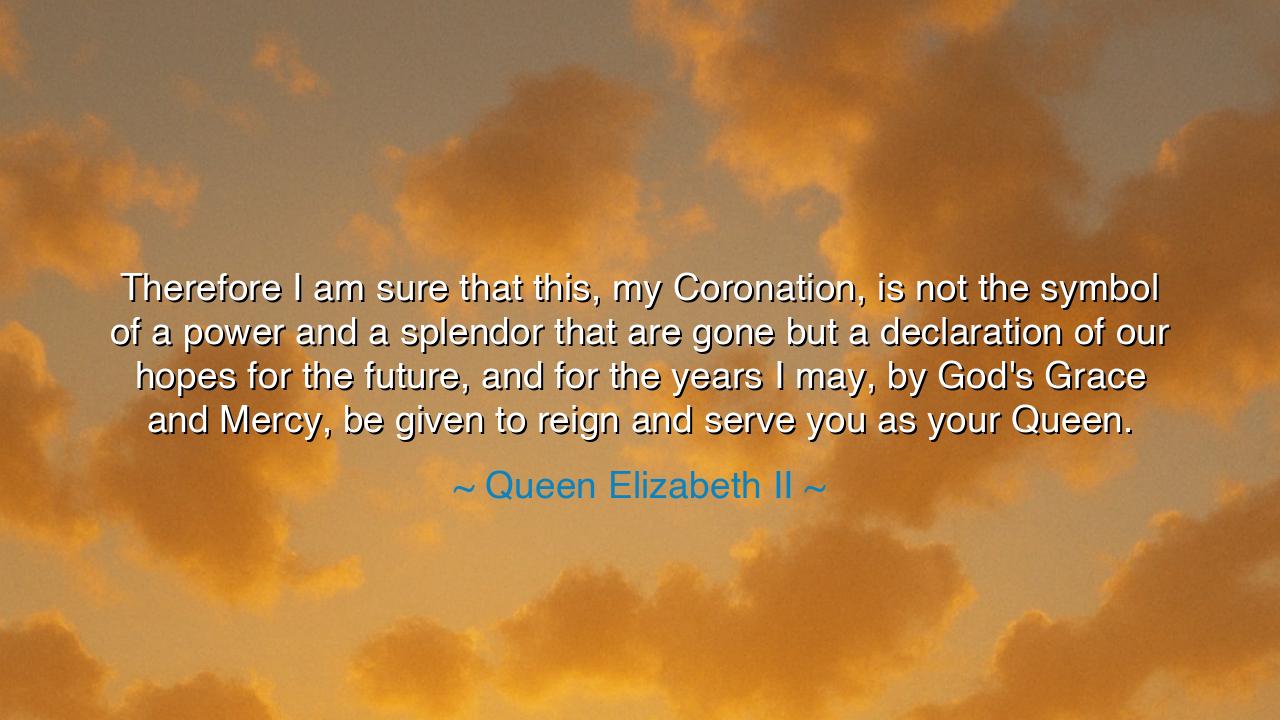
Therefore I am sure that this, my Coronation, is not the symbol
Therefore I am sure that this, my Coronation, is not the symbol of a power and a splendor that are gone but a declaration of our hopes for the future, and for the years I may, by God's Grace and Mercy, be given to reign and serve you as your Queen.






“Therefore I am sure that this, my Coronation, is not the symbol of a power and a splendor that are gone but a declaration of our hopes for the future, and for the years I may, by God's Grace and Mercy, be given to reign and serve you as your Queen.”
— Queen Elizabeth II
In this solemn and radiant declaration, Queen Elizabeth II, in the early dawn of her reign, spoke not as one who ascended a throne of pride, but as a servant of destiny. Her words, uttered on the sacred day of her Coronation in 1953, were more than royal ceremony—they were a covenant between monarch and people, between past and future. In them, she recognized the transformation of her kingdom: an empire waning, a world reshaping, a people awakening to new freedoms. Yet she saw beyond decline. She proclaimed that her crown was not a relic, but a living symbol—a torch of continuity, faith, and renewal.
To understand this moment is to understand the burden of heritage. The Queen spoke in the aftermath of war, when Britain’s might had been tested and its dominions scattered. Many believed that the age of monarchy and empire had passed, that the old grandeur of crown and scepter belonged to memory. But in this moment of uncertainty, Elizabeth stood not as a mourner of what was lost, but as a herald of what could be reborn. Her coronation, she said, was “a declaration of our hopes for the future.” She understood that power changes form; that splendor, when emptied of vanity, can become service, and that service, offered with humility, can restore greatness to any nation.
Her words mirror the timeless wisdom of the ancients: that leadership is not dominion, but devotion. In the empires of old, kings sought to rule through fear, building monuments to their might. But the truest monarchs—the ones whose memory endures—are those who serve rather than command. In her speech, the Queen invoked God’s Grace and Mercy, acknowledging that her authority was not her own, but entrusted to her for the good of others. It was an act of surrender as much as sovereignty. This humility, rare among rulers, became the cornerstone of her seventy-year reign—a reign marked not by conquest or grandeur, but by constancy, dignity, and faith.
Her words also echo through the ages with a deeper spiritual resonance. For what she expressed that day is true not only of a monarch, but of all who bear responsibility in the world. Each of us, in our own measure, receives a “coronation”—a calling to serve something greater than ourselves. It may not be crowned with jewels, but it carries equal weight: the duty to uplift, to guide, to nurture. And like the Queen, we too must look upon our moments of authority or success not as emblems of vanished power, but as opportunities to build the future. When she spoke of hope, she spoke for all humanity—for every generation that inherits a world both burdened and blessed by the deeds of those before it.
Consider the tale of Marcus Aurelius, the philosopher-emperor of Rome. Like Elizabeth, he ruled in turbulent times, when the empire trembled beneath the weight of change. And like her, he turned inward to wisdom rather than outward to pomp. “Waste no more time arguing what a good man should be,” he wrote, “be one.” So too did the young Queen, standing in the Abbey’s ancient light, choose not to cling to the splendor of monarchy past, but to embody its higher meaning: service as strength, duty as devotion, faith as endurance. It is this same spirit that preserved her through decades of trial and triumph alike.
Her statement, though royal in tone, is also profoundly human. In declaring her hope for the future, she reminded her people that every ending conceals a beginning. The British Empire had receded, but a new Commonwealth—a fellowship of free nations—was being born. Her words marked this transformation, affirming that tradition need not be a chain; it can be a root from which new life grows. She became the bridge between ages, proving that even institutions centuries old can adapt when guided by humility and grace.
And so, the lesson that flows from this quote is clear and timeless: do not mourn what is changing—shape what is coming. Whether you lead a nation, a family, or your own heart, let your actions be guided not by nostalgia for what was, but by faith in what can be. Serve, as the Queen vowed to serve, with purpose, with gratitude, and with courage. The future is not built by clinging to the past, but by honoring it through renewal.
Therefore, take her words as a blessing upon your own life: whatever role is given to you—small or great—receive it not as a throne of pride, but as an altar of service. For in serving others, as Queen Elizabeth II so gracefully showed, we become both the guardians of the past and the builders of tomorrow. Power fades, but purpose endures, and through the grace of that purpose, the future—like a crown—will shine again.






AAdministratorAdministrator
Welcome, honored guests. Please leave a comment, we will respond soon